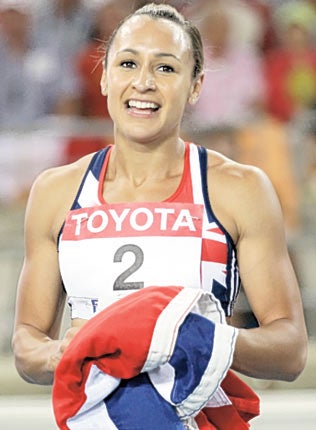Simon Turnbull: Can Ennis benefit by being a hunter not the hunted in 2012?
Olympic Diary

Your support helps us to tell the story
From reproductive rights to climate change to Big Tech, The Independent is on the ground when the story is developing. Whether it's investigating the financials of Elon Musk's pro-Trump PAC or producing our latest documentary, 'The A Word', which shines a light on the American women fighting for reproductive rights, we know how important it is to parse out the facts from the messaging.
At such a critical moment in US history, we need reporters on the ground. Your donation allows us to keep sending journalists to speak to both sides of the story.
The Independent is trusted by Americans across the entire political spectrum. And unlike many other quality news outlets, we choose not to lock Americans out of our reporting and analysis with paywalls. We believe quality journalism should be available to everyone, paid for by those who can afford it.
Your support makes all the difference.As soon as Dai Greene crossed the finish line in Daegu Stadium yesterday, it seemed the weight of his World Championship gold medal was being evaluated. After the questions about whether the reality of his achievement had sunk in, and about how he had felt playing catch-up down the home straight in the 400m hurdles final, came the query about now being the man to be shot at in his event on the road to the home Olympics in 2012.
"If I'd had a bad season this year it wouldn't have set me up very well for next year," Greene said. "It's a lot easier to do winter training when you have a gold medal on the mantelpiece."
The flipside of the same question had been put to Jessica Ennis before she left South Korea yesterday with a silver medal in her kit bag rather than a gold. "Is it not better to be the hunter than the hunted?" someone suggested to the Sheffield woman, striving to turn the negative of the world heptathlon title she had lost on Tuesday – after a disastrous performance by her in the javelin and an inspired second day by Tatyana Chernova – into the most obvious positive.
"I was more than happy being world No 1 and being chased," Ennis replied. "Then again, sometimes it's good to chase. It gives you that extra fire in your belly, makes you want to push on."
So what makes the most potent fuel for the winter, heading towards an Olympic year on the back of a World Championships? A silver or a gold? The statistics make intriguing reading.
Of the 22 male athletes who won gold at the 2007 World Championships in Osaka in 2007, only five made it to the top of the podium at the Olympic Games in Beijing a year later: Kenenisa Bekele in the 10,000m, Brimin Kipruto in the 3,000m steeplechase, Irving Saladino in the long jump, Nelson Evora in the triple jump and Gerd Kanter in the discus. In total, only 10 of the 22 Osaka gold medal winners won a medal of any description in Beijing – less than half.
Of 21 women who won gold in Osaka, only six prevailed in Beijing: Christine Ohuruogu in the 400m, Tirunesh Dibaba in the 10,000m, Yelena Isinbayeva in the pole vault, Valerie Vili (now Adams) in the shot, Barbora Spotakova in the javelin and Olga Kaniskina in the 20km walk. In all, 12 of the 21 women's world champions of 2007 got on the podium to collect an Olympic gold, silver or bronze in 2008 – just over half.
Good news then for Ennis, as a silver medal hunter – and for Mo Farah, who started as favourite in the 10,000m last Sunday and finished runner-up (and who sailed through his 5,000m heat yesterday)?
Well, of the 22 World Championship men's silver medallists in Osaka in 2007, only two struck Olympic gold in Beijing: Jeremy Wariner in the 400m and Kerron Clement in the 400m hurdles. Of the 21 women's silver medallists in Osaka, just one triumphed in Beijing: Veronica Campbell-Brown in the 200m. A grand total of three out of 43.
Then again, with Ennis and the heptathlon in mind, what happened to the last British woman to win a World Championship silver in the Olympic arena the next year? At the 1999 World Championships Denise Lewis was cut down by a Barber in Seville. A year later in Sydney, Eunice Barber of France dropped out after five of the seven events and Lewis won Olympic gold.
Not that Ennis's coach, Toni Minichiello, is resting easy on the silver lining from Daegu. "People say this is the one to lose if you have to lose one," he pondered. "That's pretty much rubbish. I'm sure Alex Ferguson doesn't say: 'I want to lose the Premier League this year and win it next year when it's more important'. You want to win everything you can."
Join our commenting forum
Join thought-provoking conversations, follow other Independent readers and see their replies
Comments